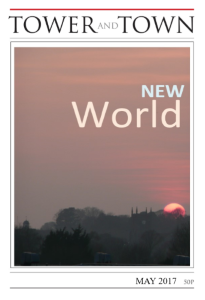

Tower and Town, May 2017 (view the full edition) (view the full edition)Notes On A New World"It was a warm sunny day as I walked down a path in South America and came across a plateau on my right. Intrigued by the presence of strange looking high trees I climbed towards the plateau and found myself in a different world". Knowledge Paradox It was within a darkened hall that the podium was illuminated by a spotlight as I talked about knowledge. This was the 2007 Dubai government meeting on electricity supply, and the subject of knowledge did not look out of place. This is because the impact of Silicon Valley (USA) and the emergence of Information Technology brought forth a new world in which knowledge constitutes a business asset. This prompted the late father of modern management, Peter F. Drucker, to coin the term "Knowledge Worker" with reference to the worker who is associate rather than subordinate due to the fact that he/she knows more about his/her job than anybody else in the organisation. Since then we have got accustomed to the terms "Knowledge Economy", "Knowledge Industry", "Knowledge Transfer" and "Knowledge Management". However, we are now going through the process of re-assessing the overlap of knowledge and information within business, and also their intricate relations with belief within the political and religious domains. Further worrying is also being stirred recently by the emerging acceptance of un-truth as pseudo hard knowledge within the social media. Thought Experiments The Old Parsonage Hotel looked rather busy on this April morning of 1992. My eyes recorded arrival of new guests with heavy looking luggage, whilst the nursery of new worlds within my head was working hard to circumvent some pre-conceived wisdoms. Not known to me at the time as I stood by the window of my Oxford office overlooking Banbury Road was that before the end of the decade my life and of that of some others would be changed forever. I was then embarking on the quest of unifying aspects of experimental nuclear physics with archaeology, art, history and conservation. Yet as I stood by that window I was then merely following a defined scientific tradition that reconciles hard scientific knowledge with mould breaking using "fluid intelligence" for solving new problems and "crystallised intelligence" for tapping into stocks of accumulated knowledge. It was after all still the early 20th century when a young man with the name of Albert Einstein It is also worthwhile to observe that the term "Space & Time" is not confined to the realms of physics. The pioneering psychoanalyst, Carl Jung, who also made his mark at the time of Einstein's thought experiments, concluded that the human psyche has life beyond time and space. Raik Jarjis |